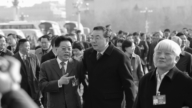【新唐人2014年09月26日讯】9月28号是孔子诞辰2565周年,以批孔起家的中共,24号在北京举行20多年来,最高规格纪念孔子诞辰国际学术研讨会。这是否意味着中共尊孔崇儒的新时代,已掀开序幕呢?不过,中共机关刊物当天发表了中国社科院院长王伟光的文章,文中强调“阶级斗争不可能熄灭”,提出了截然不同的论调。
9月24号,北京当局为孔子诞辰2565周年,举行20多年来最高规格的国际学术研讨会,和国际儒学联合会第五届会员大会,中共总书记习近平发表讲话,强调孔子创立的儒家学说以及儒家思想,对中华文明产生了深刻影响,是中国传统文化的重要组成部分。讲话还说,这次会议以“儒学:世界和平与发展”为主题,是一个很有现实意义的题目。
中共突然高调纪念孔子诞辰举动,令公众颇感诧异。新加坡《联合早报》9月25号发表文章,声称这或许意味着中国将开启尊孔新时代。
原《山东大学》教授孙文广则指出,反对传统文化的中共,过去都是站在批判孔子的立场,特别是中共第一代党魁毛泽东,向来反对孔子的儒家思想,文化大革命还发起了“批林批孔”运动。
原《山东大学》教授孙文广:“现在为什么(搞)起来尊孔呢?我想原因是多方面的,一个是过去中共它一直是选择推崇马列——马克思、列宁主义这一套,其中包括阶级斗争,消灭剥削阶级这样一些理论,那么从它建政到现在65年了,这一套马列的理论越来越不受人们的欢迎。”
孙文广表示,近年来,人们越来越清醒的认识到,中共过去灌输的马列思想的错误和荒谬,并开始排斥这一套。
孙文广:“现在它又不想彻底的推翻过去的这一套理论,不想反思自己的错误,那么又抬出孔子来做为一种掩盖,填补社会上的信仰的空白,那么就是把孔子抬出来宣传,把孔子的一些理念拿出一部分来进行说教。”
就在北京高规格纪念孔子当天,中共中央机关刊物《求是》旗下的《红旗文稿》,发表中国社科院院长王伟光的文章,题目是《坚持人民民主专政,并不输理》。文章宣称:今天的中国仍然处于马克思主义判定的历史时代,阶级斗争是不可能熄灭的。
王伟光的文章,仅在凤凰网上,就引来数十万网友的参与。有网友说:“这是要来一次文革的前奏啊”。也网友直斥:“大肆鼓吹阶级斗争,定是别有用心。”
孙文广分析,现在中共高层严重分裂,导致它的发声筒——中共媒体和御用专家、学者在言论、观点上出现混乱。
而与前几任中共领导人相比,习近平特别表现出对儒家文化的浓厚兴趣。去年11月,习近平也曾专程去山东考察曲阜孔府,在孔子研究院,他看到《孔子家语通解》和《论语诠解》两本书,说要仔细看看。
北京宪政学者陈永苗:“我经常碰到一些政府官员谈起儒家,认为自己是儒家,那孔子儒家的传统我觉得习近平他们运用起来,不外乎想论证,官僚权贵体系本身,它是有合法的传统,它是有历史的沿承的,它的统治是非常正当的,我觉得它还是为自己的合法性在做辩护。”
陈永苗认为,中共的所谓“尊孔”,类似于它在世界各地设孔子学院,目的是利用中国传统文化,为它危机四伏的专制洗白。
陈永苗说,毛泽东的一段话,清楚说明了中共目前的困境。那就是在《毛泽东文选》中,有这样一句话:共产党人是从批孔起家的,但是决不能走前面他们的路,批了再尊,……如果共产党到了没法统治或者遇到难处了,也要把孔子请回来,说明你也快完了。
采访编辑/李韵 后制/周天
New Confucius Era vs. Class Struggle?
This Sept. 28 marks the 2,565th anniversary
of the birth of Confucius.
This year, Beijing commemorated the birth of Confucius
in an elaborate event, surpassing any in the past 20 years.
The Chinese Communist Party (CCP) first established
its regime, by criticizing Confucius.
Does this commemoration suggest that the CCP
will start a new era of respecting Confucianism?
Perhaps not, seeing that Wang Weiguang, the president of
the Chinese Academy of Social Sciences (CASS) published
an article with opposing views on the same day,
saying that “class struggle cannot be extinguished."
Sept. 24—The International Conference on the 2,565th
Anniversary of Confucius and the fifth Congress of
the International Confucian Association took place in Beijing.
CCP leader Xi Jinping spoke on the profound influence of
Confucianism on China’s civilization and traditional culture.
He spoke of the significance of the conference’s topic:
“Confucianism: world peace and development."
The CCP’s sudden high-profile commemoration
of the birth of Confucius is a surprise to the world.
Singapore’s newspaper, Zaobao, commented that
this could mean a new era of respecting Confucius.
Sun Wenguang, former professor, Shandong University says
the CCP has always opposed traditional culture.
It started with criticizing Confucius; first leader, Mao Zedong
strictly opposed Confucianism, and the Cultural Revolution
was a campaign that criticized Confucius.
Prof. Sun Wenguang: “Why the respect for Confucius now?
—I believe there are many reasons."
“One is the CCP’s 65 years of pushing Marxism-Leninism;
the idea of class-struggle and eliminating the exploiting
classes is losing its popularity."
Sun Wenguang says people are increasingly understanding
and rejecting the errors and absurdity of the CCP’s ideology.
Sun Wenguang: “The CCP won’t completely overturn
its past theories or reflect on its mistakes."
“Confucius is used to cover and fill the gaps in China’s
changing social beliefs; it’s a tool for propaganda—
Confucianism is the CCP’s new tactic to indoctrinate society."
CASS president Wang Weiguang released an article titled,
“People’s Insistence on Democratic Dictatorship is Rational"
on the CCP Web portal, claiming that China is still in the era
of Marxism and it’s impossible to eliminate class struggle.
Wang Weiguang’s article attracted hundreds-of-thousands
of readers on ifeng.com.
Comments read, “This is a prelude to Cultural Revolution”
or “Trumpeting class-struggle must harbor ulterior motives."
Sun Wenguang says the serious split of ideas within the CCP
has led to chaos in its mouthpieces, including the media,
and the experts and scholars who’re loyal to the regime.
Compared with previous leaders, Xi Jinping has shown
a particularly strong interest in Confucian culture; Xi visited
Confucius’ hometown in Qufu, Shandong, last November
and expressed an interest in reading books on Confucianism.
Chen Yongmiao, Beijing constitutional scholar: “I often come
upon some government officials talking about Confucianism,
seeing themselves as being a believer."
“I think for Xi Jinping, the Confucian tradition is only
a demonstration of his bureaucratic elitist system, to try to
convince others of a legitimate rule, by using a legitimate
tradition and a sense of historical commitment."
“I consider it nothing more than an attempt to
defend the CCP’s legitimacy."
Chen Yongmiao says the honoring of Confucius by the CCP
is similar to its Confucius Institutes around the world;
its purpose is to exploit the Chinese traditional culture
in order to whitewash the CCP’s perilous authoritarian rule.
Chen Yongmiao says, one of Mao’s sentences
clearly shows the CCP’s current predicament.
In the Selected Works of Mao Zedong, there is this sentence:
“Communists are founded on criticizing Confucius, but must
not go back to honor the Confucius….If the CCP is to return
to honor the Confucius when its ruling runs into difficulty,
that means it’s almost finished."
Interview & Edit/LiYun Post-Production/ZhouTian




























